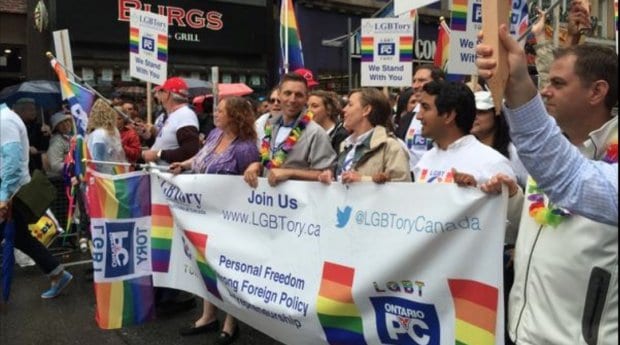A movement by LGBT Conservatives to get their federal party officially on board with same-sex marriage has met some fierce opposition just weeks ahead of a national convention.
Since January 2016, LGBTory has been pushing the federal Conservatives to drop parts of their policy book that call for a free vote on “the definition of marriage” and supporting “legislation defining marriage as the union of one man and one woman.”
What started as a letter asking for the party head’s support grew into a lobbying effort of meeting with members of Parliament, pushing for motions at local riding associations and trying to get a motion voted on at the May 26 national convention.
“We’re feeling pretty confident; we’ve got a lot of support from within the party,” says Eric Lorenzen, an executive member of LGBTory.
In recent weeks, the social conservative group Campaign Life Coalition, known for its advocacy against abortion, has mobilized its supporters to counter LGBTory’s campaign, on a national and local level.
“It’s not a surprise that they’re fighting us,” says Lorenzen, who lives in Belleville. “We met them at the Toronto policy sessions when we went down to argue against our proposal and they were there arguing against it.”
CLC has proposed six of its own motions aimed to steer the party toward values like opposing euthanasia and trans-rights legislation.
While none of the CLC motions directly counter the LGBTory proposal, one asks the party “to protect the rights of Canadian workers who believe in the traditional definition of marriage from employment discrimination.”
CLC told Daily Xtra its supporters have gotten these motions passed in eight regional policy meetings throughout BC, Saskatchewan and Ontario. LGBTory has had supporters pass motions in Alberta, Quebec and Toronto.
The Conservative Party told Daily Xtra these motions were among more than 350 proposals posted into an online system where riding associations across Canada vote for which ideas they support.
The party’s elected policy committee considers these results and meets with a mix of MPs and activists to decide which motions will get time for discussion at the Vancouver convention. A list of roughly 25 motions is expected next week.
At the May 26 convention, delegates will break into small working groups on issues like the economy, foreign affairs and, in this case, social conservative issues. It will be up to attendees in these break-out groups to convince people to support their motions, which are approved by a show of hands.
The motions then get a formal vote from the wider convention, requiring a majority of votes and a majority of each region on board.
“The social conservatives — although they’re vocal and they’re well-organized — I don’t think they constitute a majority of the party,” Lorenzen says.
A Daily Xtra survey of possible Conservative leadership candidates saw most avoid taking a position on the motion, though none of the respondents were opposed. Lorenzen says that he’s come across MPs who oppose the motion, but he won’t yet name them publicly.
“I don’t want to set anybody up for intense lobbying efforts,” he says. “We’re doing a get out the vote strategy, and the social conservatives are as well.”

 Why you can trust Xtra
Why you can trust Xtra


